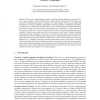Free Online Productivity Tools
i2Speak
i2Symbol
i2OCR
iTex2Img
iWeb2Print
iWeb2Shot
i2Type
iPdf2Split
iPdf2Merge
i2Bopomofo
i2Arabic
i2Style
i2Image
i2PDF
iLatex2Rtf
Sci2ools
109
click to vote
CORR
2011
Springer
2011
Springer
Finitary languages
Abstract The class of ω-regular languages provide a robust specification language in verification. Every ω-regular condition can be decomposed into a safety part and a liveness part. The liveness part ensures that something good happens “eventually.” Two main strengths of the classical, infinite-limit formulation of liveness are robustness (independence from the granularity of transitions) and simplictraction of complicated time bounds). However, the classical liveness formulation suffers from the drawback that the time until something good happens may be unbounded. A stronger formulation of liveness, so-called finitary liveness, overcomes this drawback, while still retaining robustness and simplicity. Finitary liveness requires that there exists an unknown, fixed bound b such that something good happens within b transitions. In this work we consider the finitary parity and Streett (fairness) conditions. We present the topological, automata-theoretic and logical characteriz...
Related Content
| Added | 13 May 2011 |
| Updated | 13 May 2011 |
| Type | Journal |
| Year | 2011 |
| Where | CORR |
| Authors | Krishnendu Chatterjee, Nathanaël Fijalkow |
Comments (0)

